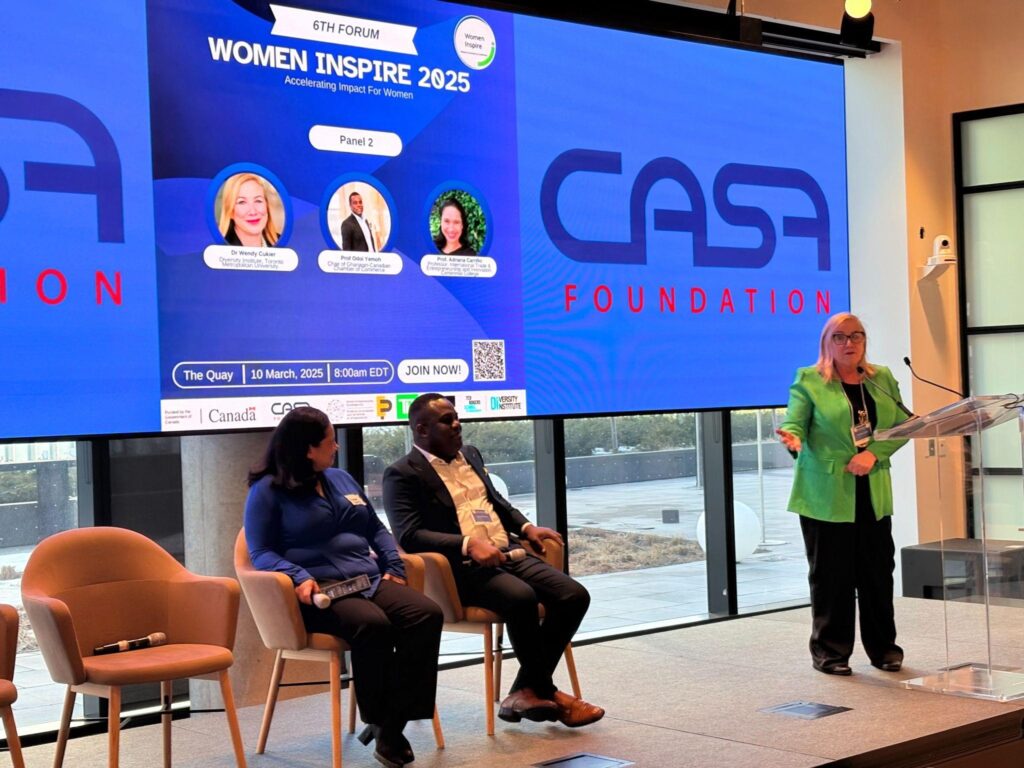Women Inspire-2025: Accelerating impact for women entrepreneurs through artificial intelligence

On March 10, in honour of International Women’s Day, Casa Foundation hosted the 6th edition of Women Inspire—Women in Business Forum, themed “Accelerating Impact for Women.” The event gathered thought leaders, entrepreneurs and business professionals to discuss strategies for fostering inclusive growth and empowering women in business.
One of the key sessions was a panel discussion on artificial intelligence (AI) and entrepreneurship, chaired by Dr. Wendy Cukier, founder of the Diversity Institute. The discussion featured insights from two distinguished panellists: Prof. Adriana Carrillo, CITP, professor of international trade, entrepreneurship and Innovation at Centennial College, and co-founder of Healthy Prickly Concepts and Prof. Odoi Yemoh, chair of the Ghanaian Chamber of Commerce, professor of mathematics of finance at Humber College and executive director of Reality Capital Management.
This panel explored how AI is reshaping the entrepreneurial landscape, particularly for women entrepreneurs and how it can be leveraged to overcome systemic barriers and unlock new economic opportunities.
Women entrepreneurs: A driving force in the economy

Dr. Cukier opened the discussion by highlighting the significant economic contributions of women entrepreneurs and the structural changes needed to ensure equal opportunities. “We are not the 51st State but women make up 51% of the population. We are not a small minority and we should not be treated as such,” Cukier emphasized.
She pointed to the State of Women’s Entrepreneurship in Canada (SOWE) 2025 executive summary, which underscores the growing impact of women entrepreneurs. In 2020, women entrepreneurs contributed $90 billion to the economy and created nearly one million jobs. By 2024, this momentum continued, with majority women-owned businesses increasing by 3.3% over the year and representing 20.9% of private sector businesses by the end of 2024. Furthermore, self-employed women entrepreneurs now comprise 37.4% of the self-employed population in Canada, reflecting a steady rise since 2017.
Despite these gains, the report also reveals persistent barriers to funding, mentorship and market access for women entrepreneurs. “There is too much focus on tech and manufacturing, even though industries where women are more active—such as health, beauty and consumer goods—often have higher growth rates and greater export potential. We must shift the conversation and ensure these industries are seen as drivers of innovation,” Cukier stated. She also emphasized that AI offers a powerful opportunity for women entrepreneurs to scale their businesses and overcome systemic barriers—if they have access to the right tools and resources. However, the State of Women’s Entrepreneurship (SOWE) report reveals a gender gap in AI adoption: only 12.3% of women-owned businesses use AI, compared to 16.5% of men-owned businesses. Closing this gap could be a game-changer, driving greater economic growth led by women entrepreneurs.
AI as a game-changer for women entrepreneurs
The conversation turned to how AI can enhance efficiency, automate business processes and provide women entrepreneurs with tools to compete in the digital economy. Prof. Odoi Yemoh addressed a common concern among entrepreneurs: Is AI a threat or an opportunity?
“The only way AI can take your job is if you do nothing. AI is a tool, not a replacement. The entrepreneurs who take the time to understand AI and apply it will be the ones leading the way,” Yemoh said. Prof. Adriana Carrillo shared her first-hand experience as a small business owner using AI to streamline marketing and business operations. “As an entrepreneur, I don’t have the resources to hire a full-time marketing team. AI-powered tools allow me to generate content, analyze trends and create social media strategies quickly,” she explained.
She noted, however, that AI is not perfect and requires human oversight. AI-generated insights must be evaluated critically to ensure accuracy and relevance, especially for niche markets.

Practical AI tools for women entrepreneurs
Dr. Cukier invited the panellists to share specific AI tools that have been beneficial for women entrepreneurs. However, the panellists also highlighted risks associated with AI adoption.Carrillo warned about data privacy concerns, explaining that many free AI tools store user inputs, which could compromise business information. Yemoh added that over-reliance on AI without verification can lead to inaccurate decisions, as AI-generated content is based on patterns rather than real-world experiences. “AI is a powerful assistant, but it should not replace critical thinking and human judgment,” Yemoh cautioned.
Harnessing AI for inclusive economic growth
The discussion concluded with a call to action: women entrepreneurs must invest in AI literacy to remain competitive.
“AI has the potential to revolutionize businesses by allowing a solo entrepreneur to appear as if they are running a multinational company,” Cukier stated. “But we need to ensure AI is used to break barriers, not reinforce them.” AI can be a catalyst for economic empowerment, but women entrepreneurs must be at the forefront of this transformation, using AI to scale businesses, expand market access and drive innovation.
